The spotlight on sugar and caffeine in soft drinks means retailers need to ensure their sports and energy range reflects shopper demand
Sales of soft drinks in convenience stores catapult during the summer (13% average uplift May-September IRI Symbols & Independents, 28 January 2018) and with sports and energy drinks the biggest selling segment for c-stores (IRI Symbols & Independents, GB, ending 29 April 2018), this sub-category is already set up for glory.
What’s more, consumers are trying to live healthier lifestyles and this year’s summer of sport should provide plenty of motivation to get energetic, so could the sports and energy sector be on the brink of running away with record sales?
Unfortunately, it’s not that simple. The debate around energy drinks and their impact on our health was thrown wide open in March, when most major UK supermarkets decided to stop selling drinks containing more than 150mg of caffeine per litre to under-16s. And there’s the Soft Drinks Industry Levy (“sugar tax”) to consider, too.
Jamie Douglas-Hamilton, founder of Actiph Water, believes the shake-ups will make a difference to independent retailers.
He says: “Retailers should consider the effect of the sugar tax and restrictions on the sale of energy drinks to minors, as we predict they will have the desired effect on sales, and high-sugar, high-caffeine drinks and sales will fall off in the long term. Our customers have already told us that it’s having an effect on demand.”
A large number of c-store retailers already operate some form of ban on selling energy drinks to minors and many have changed their policy over the past few months to match the multiples’. However, Anita Nye, manager at Premier Eldred Drive Stores in Orpington, Kent, has operated a voluntary ban on energy drinks for more than two years.
“It was ridiculous that we had primary school kids coming in and asking for a Red Bull,” she says.
Retailers are not obligated to stop under-16s from buying energy drinks, but the forward-thinking initiative employed by the team at Eldred Drive Stores helped earn them the 2018 CRA Responsible Retailing Award.
At first the restrictions caused a few problems, but customers soon got used to the changes. “At the beginning we had a few school kids throwing tantrums, but nothing too bad,” Anita explains.
“It hasn’t affected trade at all. Nine times out of 10 kids will put the high-caffeine energy drinks down and pick something else up.”
Anita admits it can be difficult to gain proof of age from school kids. Luckily, her team know a lot of people through the local school and use bus passes to check the kids’ ID.
Sid Ali, owner of five Nisa stores in Aberdeenshire, has adopted a similar policy in response to the voluntary energy drinks bans in the supermarkets.
However, he has taken the restrictions a step further by introducing a limit on the number of energy drinks each customer can buy, regardless of their age.
“I’ve introduced a limit of two drinks per shopper, to stop older kids from selling the drinks to younger ones,” he says. “If I didn’t then they would be off down the school selling them to others for an inflated price.”
Sid wants to do the right thing for both his younger customers and their parents, but isn’t convinced energy drinks fully deserve their bad press.
“Personally, I think children buying energy drinks isn’t too much of a problem. Most kids are out doing sport or being more active than us adults so they need that extra bit of energy that they then burn off.”
Sid, like many other retailers, is looking for clarity on what the boundaries are for selling energy drinks in convenience stores.
“I wish there was a better way of informing retailers about what they should be doing with their energy drinks,” he adds. “I don’t think anyone has made it clear how many energy drinks are safe to drink.
“I think we need to get retailers, suppliers, parents and health groups into the same room for a debate on the issue. That way we can properly decide how we should be selling these products.”
With this in mind, Ralph Patel, owner of The Look-In, Woodmansterne, in Surrey, has decided to operate a flexible sales policy on energy drinks to try to keep all his customers happy.
“We don’t sell to minors,” he says, “so I suppose we have restricted the sale of energy drinks. There are some kids that we know really well and when they come into the store we know that they are buying the drinks for their parents so we do sell to them.
“We want to be responsible while also offering people what they want.”
UK’s first Amazonian Guayusa leaf energy tea
BFT Drinks has created Yusa, the first drink in the UK to use the native Amazonian guayusa leaf.
The energy drink is made without tea extract or added caffeine and instead uses guayusa as its main ingredient.
Yusa is also made with carbonated water, mango and lemon fruit juices and natural flavours. It contains no added sugar or preservatives.
As the second most caffeinated plant in the world after coffee, guayusa has been approved for food and beverage use in the UK. The plant contains twice as many antioxidants as green tea.
Aimed at the health-aware consumer, Yusa aims to bridge the gap between health and energy drinks. Its natural mango and pineapple flavour is sweetened with stevia and contains less than 2.5g per 100ml, 100g of caffeine and 220mg of antioxidants per 250ml can (rrp £1.99).
BFT Drinks founder Andy Bell says: “In parts of the US where guayusa drinks have been on the market for five years, they are already outselling Red Bull 3:1 so we’re confident that Yusa will provide a real challenge to the energy drinks sector in the UK.”
Yusa is available in cases of 12.
Life after the levy
Suppliers spent years preparing for April’s Soft Drinks Industry Levy, but retailers are only now able to assess what kind of impact it has had on their sales.
Ralph remains upbeat and has confidence in the sports and energy drinks sub-category going forward.
“I don’t think the soft drinks levy is going to hurt sales over the summer,” he says. “People are still buying energy drinks and we haven’t seen a drop-off in any category within sports and energy. We’re still stocking as much Red Bull as we were before.”
His shoppers haven’t been put off by the increased cost of some non-diet drinks. “If customers want the fizzy or sugary versions when it is hot then they are going to have them,” Ralph asserts. “It doesn’t matter if they cost £1.19 or £1.35. I don’t think the levy has done anything for kids’ health.”
Sales of energy and sports drinks have held up in Wilson Rea’s KeyStore More store in Lanark, too. However, unlike Ralph, it’s diet lines that are driving most of the growth for Wilson.
He says: “Sales of diet variants are up since the levy was enforced, and so are bottled water sales. Sales of reduced-calorie options now account for a larger share of my sales than regular full-sugar drinks do.”
Simon Biddle, owner of Biddle’s Spar in Redditch, Worcestershire, believes the soft drinks levy has been effective in getting people to think more about what they are drinking and speed up the move towards healthy drinks.
“It’s been a dramatic shift,” he says. “People have moved to buying more low-sugar drinks across the store. I think some parents have even banned their kids from having some drinks because the levy has educated them about the issues with sugar.”
Simon has included more low-sugar energy drinks in his fixture. He says: “I’ve been surprised by how much of a difference there has been in sales of low-sugar and regular sports and energy drinks.
“We’ve definitely increased the number of zero lines we stock, such as Lucozade Zero.”
Carabao unveils £1m on-pack giveaway
Carabao is running an on-pack promotion, Mr Carabao’s £1m Giveaway, across its energy drinks range.
The campaign, launched on 1 July, offers consumers the chance to win a share of a £1m cash prize fund. Consumers can enter the giveaway now, with a top prize of £50,000 up for grabs.
The promotion is running across Carabao’s 325ml can range, which includes Original, Original Sugar Free, Green Apple, Green Apple Sugar Free and Mandarin Orange variants (rrp £1.19).
To enter the promotion, shoppers must input a code, found under the ring pull of the Carabao cans, on to the ‘Carabao Cash’ website
The giveaway will be supported by a £1m TV ad campaign running throughout August and September on ITV, Sky, Channel 5 and video-on-demand channels. The brand is also promoting the campaign on big screens at football stadiums and pitch-side LEDs across the UK.
Carabao chief marketing officer John Luck said: “At Carabao we are committed to growing the energy drinks market, which is why we have created a range of great tasting low- and zero-sugar energy drinks for all adults to enjoy.
“Participants in our £1m giveaway promotion are guaranteed a great tasting boost of energy to get them through the day as well as having the chance of winning a financial boost ranging from £5 to £50,000.”
Dave Brunt, of Londis Birches Head in Stoke, says sales of reduced sugar soft drinks are rising week on week – but he doesn’t think this is all thanks to the levy.
“People are becoming increasingly health conscious, but that is a trend we would have been noticing anyway. I think the soft drinks levy has just accelerated it.”
Amy Burgess, trade communications manager at Coca-Cola European Partners, points out that suppliers’ investment in low- and no-sugar options is boosting sales of energy drinks.
She says: “Innovation remains a key driver to the success of the energy sector and much of this is coming from a focus on low- or zero-sugar variants.
“The Monster Energy Ultra range, which offers four zero-sugar fruit flavours, has seen an increase of more than 112% in the past year (Nielsen value sales 52 w/e 9 September 2017), highlighting consumer demand.”
Mark Bell, strategy and planning manager at Red Bull UK, believes the growing number of restrictions on soft drinks means it is vital that retailers include better-for-you products in their sports and energy drinks range.
“With the heightened importance placed on the health agenda over the past year and the Soft Drinks Industry Levy in place, consumers expect healthier options,” he says.
“Therefore it is imperative to offer a low-calorie alternative to give consumers choice. Diet is worth £144m, which equates to 11.3% of the sports and energy category, increasing by 1.7% from last year (IRI value sales, sports and energy range segmentation, 52 weeks 20 January 2018).”
Lucozade Energy in the spotlight
Lucozade Energy is delivering its biggest ever sampling activity across the UK this summer as part of its £28m ‘Energy Beats Everything’ campaign.
The initiative is designed to drive sales of Lucozade Energy for retailers by getting the drink into the hands of more consumers.
Lucozade Energy is also handing out vouchers as part of the sampling, giving consumers 50p-off coupons to be redeemed on any Lucozade Energy or Lucozade Zero sku. An estimated seven million 150ml cans of Lucozade are expected to be given out.
Sampling is being activated nationwide in cities throughout England, Scotland and Wales. The Energy Beats Everything campaign also includes TV, outdoor and digital activity, alongside an in-store campaign to drive purchase.
Bridget Hirst, brand manager at Lucozade Ribena Suntory, says: “In the past, our extensive sampling campaigns have proven to drive a 9% sales uplift on Lucozade Energy skus in nearby stores (IRI Lucozade Energy 2017 Sampling Campaign Analysis – August 2017), so retailers should increase the brand’s visibility on shelf to make the most of this opportunity.”
The sampling activity is running throughout the summer until late September.
Healthier sports and energy drinks have had a big impact on sales in Ricky Sharma’s Holroyd Hill Costcutter in Bradford. Flavoured water products, in particular, have been a big hit.
He says: “Customers are increasingly asking for new products in the water category, particularly flavoured waters and waters that offer something different.
“Lucozade Sport Fitwater has had a lot of buzz around it following the Anthony Joshua partnership and I think that people recognise the additional benefits it offers”.
Simon has also noticed that healthier drinks are starting to dominate the sports and energy drinks category. “Sales of the regular sports and energy drinks have slowed a little, but the no-sugar lines have made up for the gap as we have seen an uplift across the board in that category,” he says.
“I think people have become more aware. We sell more flavoured waters and protein drinks.”
Juliet Barratt, chief marketing officer and co-founder of sports nutrition firm Grenade, points out that healthier skus offer retailers more display options, such as pairing the brand’s Carb Killa shakes with its Carb Killa protein bars (rrp £2.49 respectively), for maximum impact.
She says: “Low-sugar or reduced-sugar options should be dual- or multi-sited. Low-sugar options that fit the free-from criteria sit in this aisle, and protein offerings with low sugar sit in specialist sports aisles. For consumers to have a real choice between traditional and low- or reduced-sugar options, these products should also sit in the main drinks space.”
Red Bull goes for organic growth with new line-up
Red Bull is tapping into consumer demand for organic food and drink with its new Organics range.
The 100% natural drinks trade under the Red Bull brand and are available in four flavours – simply cola (strong & natural); bitter lemon (fresh & natural); ginger ale (spicy & natural); and tonic water (dry & natural) – to create a new portfolio of premium soft drinks.
The UK organic food and drinks market has grown significantly over the past six years. In 2017, the category increased to £2.2bn value sales (Soil Association/Nielsen Total Off Premise Value 2017 vs PY).
The launch of Organics gives retailers an opportunity to stock a range of flavourful soft drinks alongside Red Bull’s existing energy drinks line-up.
Red Bull strategy and planning manager Mark Bell says: “This is a really exciting step for the Red Bull brand, and highlights the increased demand for a range of organically certified, natural drinks. Organics by Red Bull offers consumers more choice when it comes to soft drink consumption occasions and its canned format is perfectly suited to on-the-go occasions.
“For retailers, the launch provides a portfolio of refreshing soft drinks that carry Red Bull’s famous logo – a real incentive for trial.”
The launch of Organics is being supported with a targeted marketing campaign and consumer product trials to drive distribution.
Organics by Red Bull is sold in 250ml cans (rrp £1.29) and is available to retailers in cases of 24.
Millennials are most commonly associated with being at the forefront of the health trend. Ralph agrees that this is true of those who shop in his store.
“I’ve noticed that some of the younger people, the 20-somethings, are coming in and going for the lighter drinks options as a healthier alternative,” he says.
Simon has also noticed that the younger generation is driving sales of healthier drinks.
“Those in their early 20s to late 30s are the ones buying the largest amount of healthy drinks,” he says.
These shoppers are also buying the drinks to take away. “It tends to be the on-the-go formats that dominate as it ties in with the food-to-go mission, which makes sense, because we sell a lot of our own sandwiches,” Simon asserts.
“If the take-home packs are on promotion, such as at the moment we have four-packs of Lucozade on offer, then they sell well. However, on-the-go is most popular.”
Mark Canniford, owner of Spar Weston-super-Mare, in Somerset, has had a similar experience in his store. “My shop is just down the road from a sports college so my main audience is quite young,” he says. “They regularly come in looking for something to keep them going throughout the day, and a sports/energy drink is the perfect solution.”
With this year’s summer of sport well and truly under way, Duncan Hill, managing director of HL Display, predicts there will be an increased interest in sports and energy drinks from shoppers across the board.
He argues that the category allows consumers to buy into the sporting lifestyle, even if they prefer watching the action from the comfort of their sofa.
“We would recommend giving these ranges extra attention from a merchandising perspective,” he asserts, “and stores should consider displaying some sports-themed visuals near the fixture – for example on aisle and overhead signage.”
Simon also thinks sales of energy drinks could benefit from the summer of sport, as long as the soft drinks brands get their marketing right. “I don’t think sports and energy drinks will go up as much as alcohol, but I think sales should be good this summer,” he asserts.
“Much of it depends on whether the brands do specific activity with retailers and launch adverts to boost sales during the events.”
A high proportion of Mark’s soft drinks chiller is dedicated to energy and sports drinks including Monster, Lucozade, Red Bull, Rockstar, and Spar’s Blue Bear own label range.
“A lot of customers tend to buy two or three energy drinks at a time,” he says, “so I generally find they prefer to buy the cheaper brands. Most customers would rather buy three for £1.35 than one for £1.30. More expensive drinks and brands such as Lucozade and Red Bull are more commonly bought by older people.”
As well as considering what brands to stock, it is also vital that retailers consider what formats are best for customers, as Mark Young, md of Intercarabao, points out.
“Pack size can be important to energy drinks sales because shoppers want to buy drinks that are practical for their day-to-day lives,” he says. “Where possible, retailers should try to stock a variety.”
There is no shortage of things for retailers to think about when stocking up on sports and energy drinks this summer. However, a focus on low- or no-sugar lines as well as making the most of this year’s packed sporting schedule should help retailers get off to a sprint start with the category.




















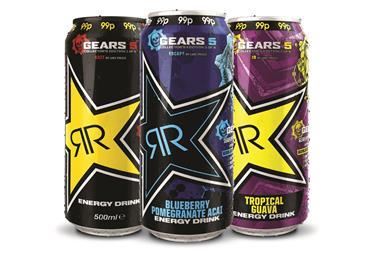
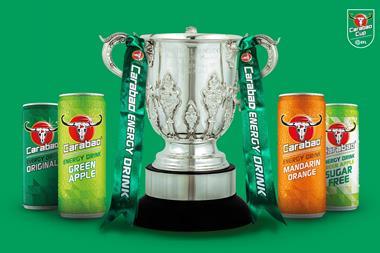
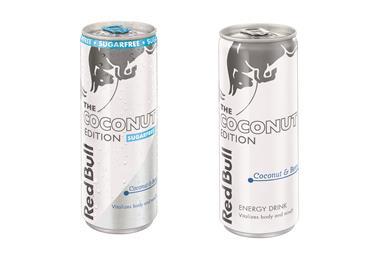
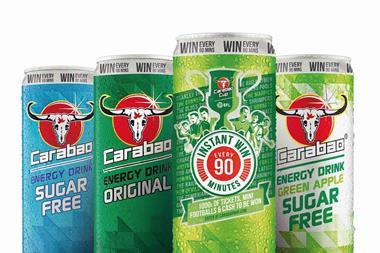

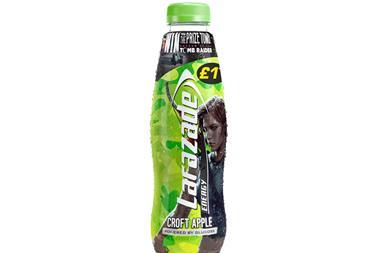
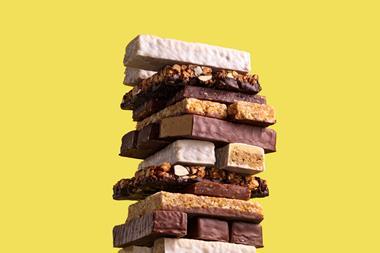

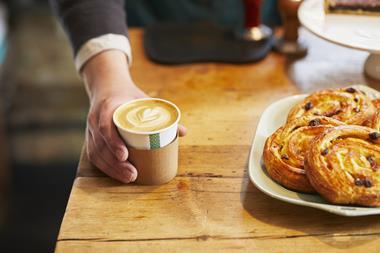
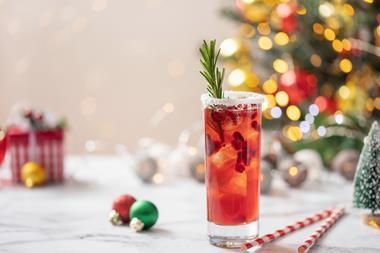

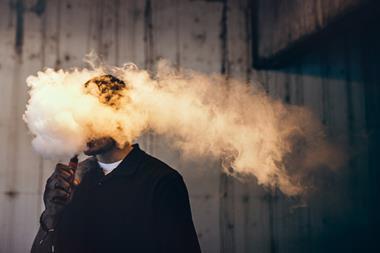
No comments yet